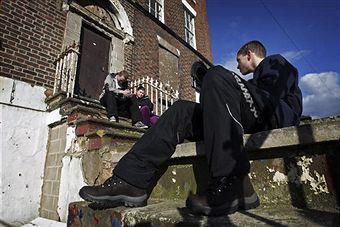 The Spectator’s summer debating season ended with a strident appeal. ‘Too
late to save Britain. It’s time to leave’. Proposing the motion, Rod Liddle claimed to have mis-read his invitation. ‘I thought this was a foregone conclusion and we’d come
here to arrange the tickets.’ Surging immigration, he said, was ruining the education system and our love lives. ‘By 2029 no one will be having sex, we’ll be so crowded
out.’ The recent election had proved nothing but democracy’s impotence. ‘The poverty gap keeps widening, financiers still get bonuses and schools support Lesbian Gay and
Trans-gender History Month.’ Soon he predicted that the definition of disability ‘will cover everyone except Ray Mears.’ He finished with a cheery valediction. ‘Get the hell
out!’
The Spectator’s summer debating season ended with a strident appeal. ‘Too
late to save Britain. It’s time to leave’. Proposing the motion, Rod Liddle claimed to have mis-read his invitation. ‘I thought this was a foregone conclusion and we’d come
here to arrange the tickets.’ Surging immigration, he said, was ruining the education system and our love lives. ‘By 2029 no one will be having sex, we’ll be so crowded
out.’ The recent election had proved nothing but democracy’s impotence. ‘The poverty gap keeps widening, financiers still get bonuses and schools support Lesbian Gay and
Trans-gender History Month.’ Soon he predicted that the definition of disability ‘will cover everyone except Ray Mears.’ He finished with a cheery valediction. ‘Get the hell
out!’
Bonnie Greer, opposing the motion, seems to have turned into Britain’s Nelson Mandela. She only has to show up and everyone applauds. Enthusing about our eccentricity she quoted JG Ballard.
‘When you go to England you realise Alice in Wonderland is a documentary.’ She hailed our habit of laughing at authority and she claimed to admire our press: ‘still free and still
rude’. A proud British subject, she’s so loyal that she uses her UK passport ‘much more often than my American passport.’
Catherine Ayer, the London bureau chief for Time, felt miserable about this country and about everywhere else. Her high hopes of British society had been dashed. Our tolerance, humour, resilience
and openness had gone, she said, and we’d become a ‘sclerotic society’ which ‘wears its history heavily’. Defeat-management is our best course. ‘If Britain
recognizes its limitations it may be able to use its resources more wisely.’ She was sorry that Obama’s optimism hadn’t crossed the Atlantic and she rated the Coalition’s
prospects at a big fat zero. On a cheerier note she felt her pessimism suited our culture perfectly. ‘No one does grey and miserable as convincingly as the Brits.’
Tristram Hunt had trouble concealing his delight at having been elected as MP for Stoke. He invited us to join him on an inter-city jaunt from the midlands to Glasgow as he mused on the
‘welcome signifiers’ of British history. His starting point, Stoke, was the cradle of the industrial revolution. In Manchester he witnessed the birthplace of scientific socialism,
feminism and vegetarianism. On the Clyde he saw how the wealth of empire had enriched the magnificent west end of Glasgow. The glory of our country today, he said paradoxically, is that ‘we
have no purpose in life.’ We are free from evangelism. We don’t need to spread democracy, pursue happiness or amplify the virtues of liberty, equality and fraternity. We can do those
things if we like, but there’s no obligation. ‘This is liberating.’
David Selbourne, a man of the left evidently appalled by the left, offered an alarming vision of Britain as a nation in moral decline. Social cohesion had once been rooted in the work ethic and
respect for public service but these values had been eroded by ‘a surfeit of rights’. John Prescott’s conversion to the virtues of aristocracy sickened him. ‘The phrase
“my Lord Prescott,” makes my stomach sink and my gorge rise.’ Of the Big Society he said, ‘No idea so vacuous has appeared in the history of political thought.’
He quoted Burke’s assertion that ‘liberty cannot exist without order and virtue.’ Daniel Hannan, closing for the opposition, agreed with Selbourne and refined the definition of
liberty as ‘the application of moral judgement.’ He turned Rod Liddle’s point about rising immigration into an endorsement of Britain’s attractiveness. ‘The in-queue
is bigger than the out-queue.’ The crowd endorsed this. The motion was defeated.
Votes:
Before the debate For 74 Against 141 Undecided 74
Dfter the debate For 88 Against 198 Undecided 1
 Lloyd Evans
Lloyd Evans
WEB EXCLUSIVE: Time to leave?






Comments